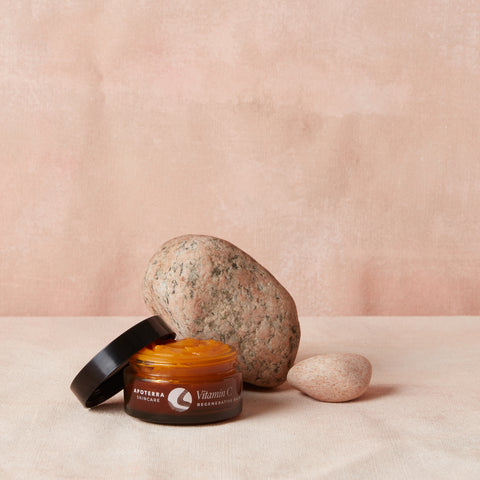Retinoids and Carotenoids...Is Vitamin A Right for MY Skin?
Vitamin A can be a powerful ingredient to address fine lines, hyperpigmentation, acne, and even psoriasis—but is it right for YOU? Read on to learn if your skin concerns will benefit from Vitamin A, or if you should avoid it!
Two Types of Vitamin A…and Why It Matters
The two main categories of Vitamin A are retinoids and carotenoids.
Traditionally, topical retinoids have been mainly derived from animal-based sources and carotenoids from plant-based sources, but today retinoids are often synthetically derived in a laboratory setting (and vegan). [1] [2]
Vitamin A deficiency is rare in the developed world as a typical diet includes plenty of retinoids and carotenoids, and both types are converted to retinol by the liver when consumed. [3] [4]. However, our skin is the most likely place to be deficient in Vitamin A, since the compound is very sensitive to degradation in UVA rays. [5]
Both retinoids and carotenoids can be used in skincare to combat this deficiency, though the benefits of their topical applications differ.
Retinoids increase cell turnover, which can be used to improve hyperpigmentation, sun spots, age spots, rough texture, and psoriasis. [6] However, retinoids can cause skin irritation and are not suitable for all skin types. (Read on to see if this includes you!)
Carotenoids protect existing cells by blocking UV rays and pollutants that cause cell damage, photoaging and skin diseases. [7] Unlike retinoids, carotenoids don’t tend to cause irritation in sensitive skin, so they can be used more liberally.
TL;DR: Carotenoids are preventative; retinoids are reparative.
Retinoids in Skincare

The two most common retinoids in skincare products are retinol and tretinoin (retinoic acid).
These retinoids traditionally came from animal sources, such as beef and chicken liver, but now they are usually lab-derived (and vegan). They are also present in smaller concentrations in plants. [8] [9]
Retinol is used in many skincare products to treat skin texture issues such as acne, sun spots, psoriasis, and hyperpigmentation. [10] Retinol can also be used to treat wrinkles and sagging by stimulating collagen production, removing damaged elastin fibers, and promoting angiogenesis (growth of new blood vessels). [11]
Tretinoin is a more concentrated form of retinol that often requires a prescription; as such, the results can be greater, but so can the side effects. Tretinoin is found in small concentrations in natural sources like rosehip seed oil. [12] [13]. Though both retinol and tretinoin can address the same skin concerns, tretinoin prescriptions are more recognized for acne usage whereas retinol is more common in anti-aging treatments. [14] [15]
These ingredients are both effective for promoting collagen, treating acne, improving texture and repairing signs of aging. However, they can cause irritation for those with sensitive skin—including eczema, rosacea, dry skin, moderate to severe scarring, skin allergies, and hormonal skin.
|
Retinol Usually lab produced and vegan (though traditionally from animal sources) Improves appearance of wrinkles, enlarged pores, and hyperpigmentation Accelerates collagen production |
Tretinoin Usually lab produced and vegan (though traditionally from animal sources) Improves appearance of wrinkles, enlarged pores, and hyperpigmentation Accelerates collagen production |
|
Available in prescriptions and over the counter. Can also be naturally found in plant and animal sources. Most often used to treat signs of aging Results occur within several months of consistent treatment [18] |
Prescription-grade is 20x more potent than OTC alternatives. Trace amounts can be naturally found in rosehip oil. [16] Most often used to treat acne [17] Results occur within several weeks of consistent treatment [18] |
Find naturally occurring retinoids in our line through rosehips (Rose Facial Oil, Vitamin C Balm, Rose Body Butter) and pumpkin pulp (Hibiscus Mud, Pumpkin Complexion Soap).
Carotenoids in Skincare

The most common carotenoids in skincare products are beta-carotene and lycopene.
Beta-carotene comes from mostly yellow and orange plant-based sources, including carrots, pumpkin, rose, passionfruit, dark leafy greens, sea buckthorn, aloe, and açaí. [19]
Lycopene comes from mostly red plant sources, including tomatoes, watermelon, papaya, guava, red bell peppers, and pink grapefruit. [20]
Carotenoids are high in antioxidants and preventative against cell damage, premature aging, hyperpigmentation, and skin diseases. They also stimulate cell turnover to replace damaged and hyperpigmented cells. [21] [22]
Beta-carotene is commonly included in skincare formulations to protect against UVA-light-induced damage, as well as to lower oxidative stress by scavenging free radicals. UVA damage is responsible for many signs of photoaging, which can be slowed by implementing beta-carotene in your routine. [23] [24]
Lycopene helps prevent damage to collagen in the skin and restore previously damaged collagen. In doing so, it prevents texture changes, discoloration, fine lines, and wrinkles. [25]
Carotenoids are plentiful in our product line through natural ingredients like carrot, sea buckthorn oil, açaí, pumpkin pulp and rosehip oil. Check out the Vitamin A skincare routine below for product recommendations!
Takeaway:
Retinoids help repair, reverse some signs of aging, and improve texture. They may be beneficial for treating acne-prone skin.
Carotenoids help prevent, reduce photo-damage, and protect from UVA radiation. They may be beneficial for repairing cell damage and hyperpigmentation.
Tips for Getting the Most out of Vitamin A Skincare
- If you use retinol in your routine, pair it with complementary ingredients (such as antioxidants like Niacinamide and coQ10) and avoid pairing it with more aggressive actives (such as Vitamin C and AHA/BHAs).
- Look for skin products formulated for your concerns: Retinoids for existing skin texture issues (described above) and carotenoids for prevention and protection.
- AVOID retinoids if you have sensitive skin or contraindicatory conditions (including, but not limited to: eczema, rosacea, dry skin, moderate to severe scarring, skin allergies, and hormonal skin).
- Carotenoids are suitable for all skin types, so make good use of them!
A Vitamin A Supportive Routine

- Pumpkin + Wild Carrot Complexion Soap - Start off by cleansing with our gentle pumpkin complexion soap with sources of beta-carotene—a perfect start to a brightening skincare routine. Our triple threat brightening formula helps to gently exfoliate and encourage lymph flow, while phytonutrients offer protection against skin damage & uneven complexion.
- Rose Essential Hydration Mist - Use a toner with retinol-supportive antioxidants, like the Niacinamide in our rose mist. When skin needs hydration, this pH balanced mist will provide it at a cellular level. Antioxidant-rich, hydrating ingredients boost the effects of our vegan hyaluronic acid, calm the skin, and protect against free radicals that cause premature skin aging.
- Retinoid Treatment - At night only, use a targeted retinoid treatment here if desired.
- Rose Nourishing Facial Oil - Choose a moisturizer containing Vitamin A. This protective facial oil contains rosehip oil and passionfruit oil, which are rich in Vitamin A. It also contains CoQ10, a retinol-supportive and collagen-boosting antioxidant. This antioxidant-rich oil that sinks quickly to protect from external aggressors, while locking in moisture and repairing signs of aging.
- Vitamin C Regenerative Balm - On days you are not using your retinol treatment, swap out the rose oil for our Vitamin C balm—which is also rich in Vitamin A from rosehip oil and sea buckthorn berry oil, as well as other collagen boosting ingredients like Vitamin C and CoQ10. This balm provides a potent treatment to plump fine lines, repair hyperpigmentation and revive the skin barrier.
- SPF - In the AM only, apply an SPF with a high UVA star rating to block UVA rays (the ones that degrade Vitamin A in the skin). In addition to SPF, many sunscreen products list their UVA star rating on a 0-5 star rating; look for 4-5 stars. [26]
- Hibiscus Exfoliating Mud - Address texture issues 2-3x per week, on days you are not taking a retinol treatment, with this natural exfoliating mud. It contains ingredients rich in Vitamin A, like açaí, rosehips, and pumpkin pulp. The hibiscus mud delivers potent antioxidants and vitamins that combat environmental stress and reveal a brighter, firmer, glowing complexion. It's a great solution for those experiencing clogged pores, hyperpigmentation or loss of elasticity.
Pumpkin + Wild Carrot Complexion Soap
Rose Essential Hydration Mist
Rose Nourishing Facial Oil
Vitamin C Regenerative Balm
Hibiscus Exfoliating Mud









